Sunday Times 2
A cardio-thoracic project in Jaffna with patients’ best interest at heart
By Kumudini Hettiarachchi
Spotting whom many call “the tallest person in Sri Lanka”, he walks up to him and tells him to hold out his hands, palm downwards, followed by a look into his mouth. After a cursory glance in which he sees “long thinned fingers and a high-arched palate”, he murmurs that 7’3″ tall Kunasingam Kasinthiran has features of Marfan Syndrome and should get it confirmed and followed up at the Jaffna Teaching Hospital.
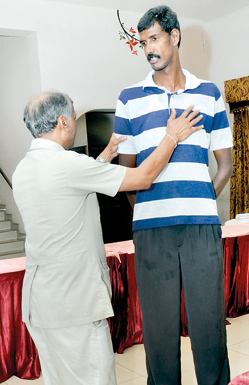
Heart to heart: Dr. Ravi Perumalpillai (also inset) examining Kunasingam Kasinthiran, the tallest man in Lanka. Pix by Susantha Liyanawatte
As he questions Kasinthiran about some of the symptoms that he has been experiencing, it is obvious that he knows what he is talking about. For, Marfan Syndrome is a genetic disorder of the body’s connective tissue which can cause the aorta (the main vessel taking blood from the heart to the body) to become stretched or weak.
It is not only this very knowledge and skill but also deep concern that has brought eminent Heart Surgeon Dr. Ravi Perumalpillai all the way from Oxford in England to Jaffna in Sri Lanka. The prime mover behind the Oxonian Heart Foundation (OHF), he hopes to help hundreds of men, women and children in the Northern Province as well as the North Central Province and the Eastern Province.
Dr. Perumalpillai who retired about two years ago as Consultant Cardiac Surgeon from the prestigious John Radcliffe Hospital in Oxford is no stranger to the ‘heart troubles’ of Sri Lankans. Not only had he served as an intern at the Jaffna Hospital way back in 1974-75, but after becoming a Heart Surgeon he has also brought teams from Oxford on four occasions to strengthen best practices in connection with cardiac surgery at the National Hospital and the Sri Jayewardenepura Hospital. Many are the links he has also developed with local heart surgeons who have gone for training to Oxford and those including doctors who have had open-heart surgery under his scalpel.
Originally from Jaffna, 62-year-old Dr. Perumalpillai who studied initially at Trinity College, Kandy, has spent most of his life abroad, in Sudan and Somalia and then boarding school in England and later medical school at the University College, London. Although there were only on-and-off visits to his motherland in addition to his internship after which he secured registration with the Sri Lanka Medical Council, Dr. Perumalpillai smiles that the links have been strong, adding, “I also married a Sri Lankan”. (His wife Shanti Jayewardene, an architect-historian is the niece of the late President J.R. Jayewardene.)
When Dr. Perumalpillai was an intern at the Jaffna Hospital in the mid-70s, no open heart surgery was done there. The situation has remained static and even 30 years later, humble people have to travel all the way to Kandy or Colombo. This is what pulled at the heartstrings of Dr. Perumalpillai and acted as the stimuli for the launch of the OHF.
Pleace turn to Page 10
Just a stone’s throw from where we interview Dr. Perumalpillai, is the overcrowded heart clinic of the Jaffna Hospital. This tertiary care centre for the Northern Province caters to a population of 1.2 million from the Jaffna peninsula, Kilinochchi, Mullaitivu, Mannar and Vavuniya.
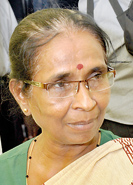
K. Sandanalakshmi: One of the patients requiring heart surgery
“We also attend to patients from the east,” says Consultant Cardiologist Dr. Poopalan Lakshman who along with Consultant Cardiologist Dr. Mahesan Guruparan and Paediatric Cardiologist Dr. Ruwan Morawakkorale has to deal with a large number of adults and children.
Jaffna Hospital did have a Cardiothoracic Surgical Unit up to 1984 but when the then Heart Surgeon left operations came to a standstill, the Sunday Times understands. Two-hundred patients including those who had holes in the heart and others who required surgical correction of valvular stenosis had been attended to from 1970 to 1984.
According to Dr. Lakshman, the Cardiology Unit was revived in 2005 with the installation of an echocardiogram machine and a five-bed Coronary Care Unit for acute patients with the infusion of Rs. 24 million by the Dr. G.R. Handy Memorial Fund. This was followed in 2008 by a 16-bed ward and an essential catheterisation laboratory in July 2011 with a soft loan from the French government.
Before the cath lab came to the Jaffna Hospital, they turned away numerous patients, requesting them to go either to the Kandy Hospital or the National Hospital or in the case of those who could not be on a waiting list as it was a matter of life and death for them, and could pay for surgery, to the private sector, the Sunday Times understands.
Now the Jaffna Cardiology Unit handles angiograms, angioplasty, pace-maker implantation and device-closure of holes in the heart, explains Dr. Lakshman, lamenting, however, that with the numbers they are seeing, patients have a month’s wait for an angiogram.
If the angiogram reveals a vessel block, the patients either have to go to Kandy or Colombo or the private sector, it is learnt, with the government hospitals in Kandy and Colombo having long waiting lists for surgery.
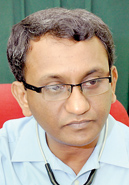
Dr. Poopalan Lakshman
Young people are falling victim to heart disease, points out Dr. Lakshman, explaining that with non-communicable diseases such as diabetes being rampant they see many patients between 40-50 years who are the breadwinners. If something happens to them, their families also collapse.
“There is also a continuous flow of people, mostly women, from the Wanni with rheumatic valvular heart disease, a disease which is more prevalent among those with a low socio-economic standing. Managing pregnant women who have heart disease is another problem,” he points out, urging the establishment of a cardiothoracic surgical unit at the Jaffna Hospital. “We need an operating theatre for cardiac surgery and an intensive care unit as also heart surgeons and paramedical and nursing staff,” he adds.
The cath lab is under-utilised, according to him, because certain high risk procedures require a heart surgeon to be on hand. From July 2011 to date, 1,971 coronary angiograms, 145 angioplasty and stenting, 83 permanent pace-maker implants, 35 balloon valvuloplasty and 23 device closures of holes in the heart have been performed while the unit also undertakes 40-50 echocardiograms per day for six days of the week and 6-8 treadmill exercise ECGs per day for five days of the week.
The urgent and vital necessity for more facilities is pressed home when the Sunday Times sees the crowd at the Friday heart clinic of the Jaffna Hospital. The work of the cardiologists is heavily cut out, for not only the clinic on Friday but also the one on Monday has more than 250 patients each, while on Tuesday, the ‘anti-coagulation’ clinic has 100 patients. Every Saturday is dedicated for patients from Batticaloa who require angiograms. There are also outreach clinics in Kilinochchi every month, Vavuniya twice a month and Point Pedro once a month.
Long waiting lists are not the only problems that patients from the Northern Province would face when they seek heart surgery in Colombo or Kandy. Language issues, getting about in Colombo and Kandy and huge costs in finding accommodation if relatives wish to be with patients are some of the other problems, while back in Jaffna their families’ routines would be in disarray. K. Sandanalakshmi (60), Thangavadivel Dharmakulasingam (60), S. Sriskandarajah (61) and E.L. Puvirajasingam (57) are just four of the numerous patients at the clinic that day.
While Sandanalakshmi has been diagnosed with several vessel blocks and given medication as she does not have the money to go to Colombo immediately for the operation, Thangavadivel has three blocks.
Sriskandarajah who has undergone bypass surgery in India in 1996 got chest pain once again and found to his dismay that eight more blocks had developed which he got cleared through open heart surgery in 2011 at a huge cost.
“For three months I was in Colombo and my wife who was staying with a relative in Colombo had to come every day by auto to see me,” he says, adding that all the while their children were in Jaffna being looked after by relatives. “When my wife who is a teacher ran out of leave, I was all alone in a Colombo hospital.”
It was a similar tale of hardship that Puvirajasingam who had six vessel blocks revealed. These are the people and children whom Dr. Perumalpillai’s OHF is hoping to help, alleviating their worries and expenses and healing them by providing cardiac surgical facilities in Jaffna itself.
Deal with private hospital to help poor patients
The Heart Surgeon-Founder of the non-profit Oxonian Heart Foundation (OHF) is on a mission – to raise US$ 1 million (around Rs. 133 million) initially to get it off the ground by April, next year (2014).
With a promise from the private 60-bed Northern Central Hospital (NCH) that its state-of-the-art operating theatres and facilities would be part of the OHF plan to provide a service to the people, Dr. Perumalpillai’s vision is simple but at the same time complex.
The “seeding” project is to ensure that the impoverished men, women and children of the north would have access to heart surgery easily and promptly.
With plans by Dr. Perumalpillai to “relocate” in Jaffna, he is set to oversee the partnership with the NCH which has committed a high-grade operating theatre, a four-bed intensive and high dependency area and a 10-bed pre and post operative ward for heart patients.
For every five patients who will pay for cardiac surgery, we will carry out one operation on a needy person free of charge, assured NCH’s Human Resources Coordinator Prof. Vythialingam Parameswaran, adding that more surgeries would be performed on the needy through a sponsorship programme.
OHF, the driving force behind the project, which is registered as a charitable trust in Sri Lanka and a charity company in the United Kingdom will fund a team from Oxford which will train, monitor and support the start-up cardiac programme until it is off the ground and sustainable with a local surgical team, it is learnt.
When asked why a partnership with the government hospital was not feasible, Dr. Perumalpillai points out that with budgetary restrictions, dearth of expertise and high capital involved in setting up and sustaining a specialised field such as cardiac surgery, the development of an equipped state facility may not materialise in the near future in Jaffna.
We would have had to start from scratch, he says, creating the image of a “green field” with no infrastructure. But with the NCH, all these facilities are in place. The other challenge for Dr. Perumalpillai would be to get more young doctors to take to cardiac surgical training.
They need to be made aware that cardiac surgery brings together the three major specialities of surgery, cardiology and intensive care. While manual dexterity is important, there is also a need to exercise the intellect, says this Heart Surgeon who not only got his training in this “exciting” speciality in London but also at the famous Johns Hopkins Hospital in Baltimore, America.
The risks of heart surgery are high but the benefits are enormous. As soon as the operation is over, more blood flows to the heart and the patient is safe almost instantly, he adds.
Deal with private hospital to help poor patients
The Heart Surgeon-Founder of the non-profit Oxonian Heart Foundation (OHF) is on a mission – to raise US$ 1 million (around Rs. 133 million) initially to get it off the ground by April, next year (2014). With a promise from the private 60-bed Northern Central Hospital (NCH) that its state-of-the-art operating theatres and facilities would be part of the OHF plan to provide a service to the people, Dr. Perumalpillai’s vision is simple but at the same time complex.
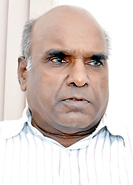
Prof Vythialingam Parameswaran
The “seeding” project is to ensure that the impoverished men, women and children of the north would have access to heart surgery easily and promptly.
With plans by Dr. Perumalpillai to “relocate” in Jaffna, he is set to oversee the partnership with the NCH which has committed a high-grade operating theatre, a four-bed intensive and high dependency area and a 10-bed pre and post operative ward for heart patients.
For every five patients who will pay for cardiac surgery, we will carry out one operation on a needy person free of charge, assured NCH’s Human Resources Coordinator Prof. Vythialingam Parameswaran, adding that more surgeries would be performed on the needy through a sponsorship programme.
OHF, the driving force behind the project, which is registered as a charitable trust in Sri Lanka and a charity company in the United Kingdom will fund a team from Oxford which will train, monitor and support the start-up cardiac programme until it is off the ground and sustainable with a local surgical team, it is learnt.
When asked why a partnership with the government hospital was not feasible, Dr. Perumalpillai points out that with budgetary restrictions, dearth of expertise and high capital involved in setting up and sustaining a specialised field such as cardiac surgery, the development of an equipped state facility may not materialise in the near future in Jaffna.
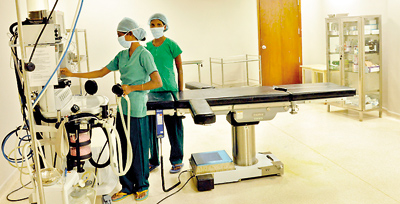
State of the art facilities at the Northern Central Hospital (NCH), which has undertaken to carry out cardiac surgery on one needy person for every five patients who will pay for their cardiac surgery
We would have had to start from scratch, he says, creating the image of a “green field” with no infrastructure. But with the NCH, all these facilities are in place. The other challenge for Dr. Perumalpillai would be to get more young doctors to take to cardiac surgical training.
They need to be made aware that cardiac surgery brings together the three major specialities of surgery, cardiology and intensive care. While manual dexterity is important, there is also a need to exercise the intellect, says this Heart Surgeon who not only got his training in this “exciting” speciality in London but also at the famous Johns Hopkins Hospital in Baltimore, America.
The risks of heart surgery are high but the benefits are enormous. As soon as the operation is over, more blood flows to the heart and the patient is safe almost instantly, he adds.
Donate to save a life
Please show you have a heart and save a life. Contributions may be channelled to Oxonian Heart Foundation (Account Name):
In Sri Lanka –
” HSBC Account No. 001-034727-001 (Swift Code: HSBCLKLX)
” Hatton National Bank Account No. 003010497806 (Swift Code: HBLILKLX)
In the United Kingdom to -
” HSBC Account No. 03859916 [The International Bank Account No (IBAN) is: GB05MIDL40353403859908; Branch Identifier Code (SWIFT) MIDLGB2108P; Sort Code: 40-35-34]
For more information please access www.oxonianhf.com; email: chairman@oxonianhf.com or phone: +44-7850730203 (UK) or +94-778573717 (Sri Lanka).

